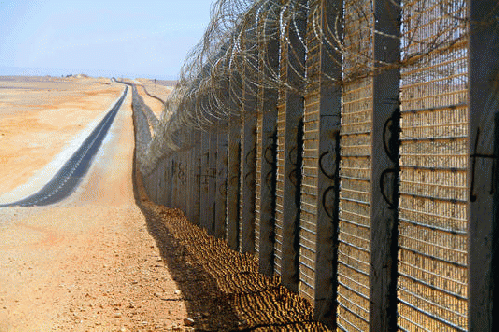
Uber wants to build a border wall across the future--and it wants Uber drivers to pay for it!
(Image by Idobi (flipped)) Details DMCA
"Everything that can be automated, will be automated."
Once an edgy and shocking thing to say, this has become a truism today. Take, for example the relative lack of surprise shown in the media by Uber's recent announcement that it will be rolling out a fleet of driverless taxis in Pittsburgh in the near future. We've been hearing about the coming of self-driving cars so long that at this point, they just seem inevitable. Or, to give the reaction of an Uber driver, disappointed about her impending replacement:
"Wo-o-o-o-w," Cynthia Ingram said. "We all knew it was coming. I just didn't expect it this soon."
Scholars and journalists debate what the impact will be of the expected new wave of automation. Will there be a "jobocalypse," or "robopocalypse," in which every job "below the algorithm" is destroyed, the middle class eviscerated, and a greater divide is created between the haves and have-nots? Or more hopefully, will automation simply lead to the creation of more jobs, and a higher standard of living in a new "second machine age?" Or are we all being a bit too credulous, worrying about changes that will in fact be very slow, never actually happen, or even just turn out kind of lame?
(For the time being, ironically enough, Uber's driverless fleet will actually increase employment, by replacing your single UberX driver (an independent contractor who is lucky if they are bringing in minimum wage with their ridesharing "gig") with two test engineers (who will be better paid, and unlike all Uber drivers, will receive employee benefits).)
Futurists can debate until they're blue in the face; there's something important that they're all missing with this focus on what will happen in a fully automated future. It's time we paid more attention to something that all this concern about the future tends to obscure: the effect which all this planned automation has today, here and now.
The most dangerous effect which the threat of automation has today is as a border wall across the future.
You're all familiar with the nut-case US presidential candidate who wants to "build a wall" along the entire border with Mexico. His is only the latest in a long series of such plans to "keep out immigrants" by "securing our borders." But what does such border security really bring about? Border walls (and fences, and checkpoints, etc.) don't really keep out all the migrants. If they did, the effect on those sectors of the American that depend on migrant labor would be catastrophic. If border walls actually kept everyone out, they would be opposed, not just by bleeding hearts and leftists, but by powerful capitalist interests as well. Instead, what border walls are meant to do is to keep migrant workers desperate and intimidated--to make them more malleable and servile than they would be, if they could come and go more freely.
And that is exactly the effect which plans for automating work are having today. The point is not actually to replace actual human workers, but to threaten workers with replacement. Whatever the long-term effects of automation will be, right now it is all about undermining the will and determination of workers to organize and take control of their own working conditions.
It's no accident that Uber, of all tech companies, is leading the charge to automate their workforce. Uber CEO Travis Kalanick has long been clear about his goal to get rid of drivers, who he dismisses as "the other dude in the car." And no wonder: almost all of the biggest existential challenges to Uber's business model stem from its strained relationship with drivers. Uber drivers are angry with the company for lowering rates, for refusing to include a tip option, and for giving more preference to passengers than to drivers. All across the country, there are moves to unionize Uber drivers. And most significantly, drivers have mounted court cases which may end up forcing Uber to recognize their protected status as employees instead of independent contractors, which at the very least would end up costing the company an expensive settlement, and at the most could completely undermine the already shaky belief of Uber investors that they will someday be getting back their money.
So you can be sure that that sense of disappointment expressed by the Uber driver above is all part of the plan. Like a border wall across the future, the threat of impending automation is being used to dissuade Uber drivers from seeing a future in their work, and to undermine their sense of purpose in organizing to gain greater power over their own workplace. If automation is inevitable, why bother? The result is just what Uber (and Target, and Lowe's) really wants: a more docile and less critical workforce, here and now.
(Article changed on September 10, 2016 at 12:15)




